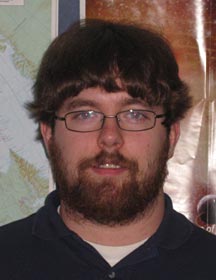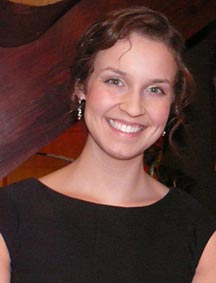Alexander D. Wright
After spending his early years in Saint Andrews, New Brunswick, Sandy completed high school in Ottawa, Ontario. His passion for injury diagnosis and management, in the contexts of both patient care and health-related research, are rooted in his experiences with several athletic injuries. While completing a Bachelor of Science in Kinesiology at Simon Fraser University, he worked as a personal and athletic trainer, and research assistant. In pursuit of his research interests in injury biomechanics, Sandy completed a Master’s degree at the University of Waterloo in the Injury Biomechanics and Aging Laboratory under the supervision of Dr. Andrew Laing. His dissertation work evaluated the potential of new safety flooring systems to prevent fall-related head injuries in older adults.
Currently, Sandy lives in Kelowna, British Columbia with his wife and daughter. He is enrolled in the Southern Medical Program at the University of British Columbia (UBC) Okanagan, where he is studying in the combined MD/PhD program. He was recently awarded a Vanier Canada Graduate Scholarship to support the PhD component of his program, which will be completed under the supervision of Dr. Paul van Donkelaar in the Integrated Sports Concussion Research Laboratory. He will also be working closely with Dr. Philip Ainslie, School of Health & Exercise Sciences at UBC Okanagan, and Dr. Alexander Rauscher, MRI Research Centre at UBC Vancouver. Sandy’s research is focused on understanding the cause of the changes in brain function that we observe following sports-related concussion, and uses novel neuroimaging techniques to explore potential links between head impact biomechanics, control of brain blood flow, and subtle structural changes in the brain’s nerve fibres. He is honoured to receive support towards this research from the Leonard and Kathleen O’Brien Humanitarian Trust.
Daniel LeBouthillier
Daniel grew up in the small town of Lagacéville in North East New Brunswick. He received his Bachelor of Science with First Class Honours in Psychology from the University of New Brunswick (Fredericton) in 2011. He is currently completing his Master of Arts in Clinical Psychology under the supervision of Dr. Gordon Asmundson at the University of Regina. Daniel’s current research focuses on anxiety sensitivity. His Master’s thesis is a randomized controlled trial investigating the effect of a short bout of exercise on anxiety sensitivity. He will continue this line of research when he begins his doctoral studies in the fall of 2014. Daniel hopes to become a researcher and clinical psychologist after completing his studies.
David Themens

David Themens was raised in Charlo, New Brunswick. He received his Bachelor of Science with honours in Physics and a minor in Mathematics from the University of New Brunswick in May, 2011. His honours research focused on the remote sensing and modeling the ionosphere, an ionized layer of the upper atmosphere between 100km and 2000km altitude. The ionosphere is an important medium for High Frequency (HF) radio communications and a significant hurdle to positioning systems users, producing errors in the range of 10m to 100m. Realizing that tropospheric weather forecasting and modeling was far more developed then its upper atmospheric counterpart, David completed a Master’s of Science in the Department of Atmospheric and Oceanic Science at McGill University under the supervision of Dr. Frédéric Fabry in September, 2013. His research during his tenure at McGill focused on developing new techniques for retrieving information from passive remote sensing instruments, namely Microwave Radiometers, and on assimilative modeling of the lower atmosphere. In 2013, David returned to the University of New Brunswick to begin a Ph.D., where he is applying tropospheric techniques to ionospheric modeling and remote sensing. Using these techniques he will develop a real-time model of the ionosphere for the High Arctic Region, where the ionosphere is most dynamic and structurally complex. In addition to the support provided by the O’Brien Foundation, David is supported by an NSERC Postgraduate Doctoral Scholarship.
David has been an avid fencer since 2000. He began fencing at the Aux Quatre Vents fencing club in Dalhousie, New Brunswick, training first under Dr. Bernard Quintal and later his elder brother Paul Themens. After completing high school he joined the University of New Brunswick fencing club, where he served as the club’s Vice President (2009-2011) and Acting President (2010-2011). During this period, David represented the UNB Fencing Club regionally and New Brunswick nationally. While undertaking his Master’s in Montreal, David trained at the Escrime Mont-Royal fencing club under Master John Harvie and competed in the Quebec and National circuits. Upon returning to the University of New Brunswick, David rejoined the UNB Fencing Club, serving as an assistant and high performance coach. As of April, 2014, he is the President of the UNB Fencing club.
Eric G. Bowes
 After graduating from James M. Hill Memorial High School in his hometown of Miramichi, New Brunswick, Eric began a Bachelor of Science Degree at Mount Allison University in Sackville, New Brunswick in 2009. During his time at Mount Allison he was fortunate to have the opportunity to work on several chemistry projects as part of Dr. Steve Westcott’s ‘Wild Toads’ research team over a period of three years. His experience in the Toads lab, focusing primarily on the investigation of boron-containing molecules with antimicrobial properties and titanium compounds with the ability to catalyze important chemical reactions, instilled in him a love for chemistry that has led him to pursue a doctorate in the science. After graduating with an honours degree in chemistry from Mount Allison University in the spring of 2013, he also had an opportunity to travel to Tarragona, Spain to work with a research team at Rovira i Virgili University, looking at new ways to introduce the element boron into organic molecules.
After graduating from James M. Hill Memorial High School in his hometown of Miramichi, New Brunswick, Eric began a Bachelor of Science Degree at Mount Allison University in Sackville, New Brunswick in 2009. During his time at Mount Allison he was fortunate to have the opportunity to work on several chemistry projects as part of Dr. Steve Westcott’s ‘Wild Toads’ research team over a period of three years. His experience in the Toads lab, focusing primarily on the investigation of boron-containing molecules with antimicrobial properties and titanium compounds with the ability to catalyze important chemical reactions, instilled in him a love for chemistry that has led him to pursue a doctorate in the science. After graduating with an honours degree in chemistry from Mount Allison University in the spring of 2013, he also had an opportunity to travel to Tarragona, Spain to work with a research team at Rovira i Virgili University, looking at new ways to introduce the element boron into organic molecules.
In addition to chemistry he also has a passion for the outdoors, and spends his free hours running, cycling, skiing and climbing. He is currently working toward a doctorate in inorganic chemistry under the supervision of Dr. Jennifer Love at the University of British Columbia, where he will be working on the development of platinum catalysts with the ability to convert methane gas into functionalized, value-added products.
Kelsey Knowles
 Kelsey Knowles grew up on the Bay of Chaleur in North-Eastern New Brunswick. At a young age, Kelsey became involved in a number of community projects and extracurricular activities. In 2011, she passed along her passion for athletics by founding a sports and leadership camp for youth in Bathurst, New Brunswick. After graduating from Bathurst High School with Honours, Kelsey travelled to Fredericton, New Brunswick where she completed an Honours degree in Criminology at St. Thomas University, which was funded by both an Evelyn Sweezy Scholarship and a Canadian Millennium Scholarship. Her undergraduate research focused on the seminal work of Travis Hirschi, as she looked at the relationships between school social bonds and self-reported delinquency. Kelsey furthered her passion for education and youth by completing a Bachelor of Education at St. Thomas University in 2012.
Kelsey Knowles grew up on the Bay of Chaleur in North-Eastern New Brunswick. At a young age, Kelsey became involved in a number of community projects and extracurricular activities. In 2011, she passed along her passion for athletics by founding a sports and leadership camp for youth in Bathurst, New Brunswick. After graduating from Bathurst High School with Honours, Kelsey travelled to Fredericton, New Brunswick where she completed an Honours degree in Criminology at St. Thomas University, which was funded by both an Evelyn Sweezy Scholarship and a Canadian Millennium Scholarship. Her undergraduate research focused on the seminal work of Travis Hirschi, as she looked at the relationships between school social bonds and self-reported delinquency. Kelsey furthered her passion for education and youth by completing a Bachelor of Education at St. Thomas University in 2012.
Kelsey is currently enrolled in the Master of Arts in Education program at the University of Ottawa. Her Master’s research, funded by the O’Brien Foundation and the Social Science and Humanities Research Council of Canada, is a phenomenological inquiry into the cultivation of present moment consciousness in teacher education. Kelsey’s thesis research is theoretically inspired by the work of Max van Manen and Ted T. Aoki, whose contributions to education and child-centered philosophies speak to the value of teacher pedagogy and tact. Following the completion of her Master’s degree, Kelsey plans to pursue her research at the doctoral level.
Maryse Arseneault
 Based in Moncton, New-Brunswick, Maryse Arseneault is presently pursuing a Master's Degree in Studio Arts at Concordia University (Print Media division). Since her Bachelor of Fine Arts Degree in painting and print-making (Université de Moncton 2006) she shares a studio in the Centre culturel Aberdeen (Moncton, New Brunwick), where she volunteers with Galerie Sans Nom and Imago Printshop. Twice a recipient of ArtsNB creation grants (2007 and 2011), Maryse’s solo shows in artist-run centres include Une coupe de cheveux pour la fin du monde / Haircuts for the end of the world (Galerie Sans Nom 2012), and Sanguine, Terre Brulée et autres Angoisses / Sanguine, Burnt Umber and other Sorrows (Eastern Edge Gallery 2013). She continues her practice in print, drawing, and interactive performance, with her recent piece L'art de s'envoler / Flyer for Flight, a series of workshops in parks with instruction pamphlet (Galerie du Nouvel Ontario 2015)
Based in Moncton, New-Brunswick, Maryse Arseneault is presently pursuing a Master's Degree in Studio Arts at Concordia University (Print Media division). Since her Bachelor of Fine Arts Degree in painting and print-making (Université de Moncton 2006) she shares a studio in the Centre culturel Aberdeen (Moncton, New Brunwick), where she volunteers with Galerie Sans Nom and Imago Printshop. Twice a recipient of ArtsNB creation grants (2007 and 2011), Maryse’s solo shows in artist-run centres include Une coupe de cheveux pour la fin du monde / Haircuts for the end of the world (Galerie Sans Nom 2012), and Sanguine, Terre Brulée et autres Angoisses / Sanguine, Burnt Umber and other Sorrows (Eastern Edge Gallery 2013). She continues her practice in print, drawing, and interactive performance, with her recent piece L'art de s'envoler / Flyer for Flight, a series of workshops in parks with instruction pamphlet (Galerie du Nouvel Ontario 2015)
Melanie Boudreau

Currently a PhD candidate at Trent University, Melanie Boudreau comes from Harvey NB. She began her academic career at UNB in Fredericton, obtaining a Bachelor’s of Science with honors. After several jobs, including a summer working with adult sturgeon in Manitoba and an internship where she worked on several projects looking at mudflat ecology in the Bay of Fundy, she decided to follow her love for scientific research and completed a Master’s in Biology at Mount Allison University. After working on a 17-month field project, supervising a couple honors students and publishing several papers during her Master’s she continues to be passionate about her research geared career path.
Her current PhD work focuses on the non-consumptive effects of predation in snowshoe hare populations. In the boreal forest, snowshoe hare populations undergo a regular cyclic fluctuation with 8-10 years between peak densities. Predator populations follow this fluctuation with a lag of 1-2 years and, during hare population decline, predators can cause up to 100% of hare deaths. Only recent work suggests that these declines also involve non-consumptive predation effects, with hares during decline years experiencing chronic stress potentially leading to increased vigilance, altered foraging, and lower productivity. However, to date, perceived predation risk in snowshoe hares has only been assessed in penned hares leaving fundamental gaps in the understanding of how free-ranging hares respond to perceived risk, whether risk responses transcend multiple (e.g. behavioral, physiological, etc.) axes and if these responses translate demographically. Her work will focus on measuring behavioral, physiological and energetic responses of free-ranging hares in areas of increased predation risk and quantify the extent that risk can generate reduced hare fitness and ultimately population decline and cyclic attenuation.
Third Recipient of an O’Brien Foundation Alumni Fellowship
Heather Nichol
 Heather grew up in Campbellton, NB. Her interest in the brain started at an early age, sparked by a psychology class she took at summer camp. Her interest grew throughout her high school biology courses and, with dreams of a career in medical research, she decided to pursue a Bachelor of Science (Honours) at Queen’s University. A major in Life Sciences allowed her to study the human body and specialize in neuroscience. She completed an undergraduate thesis project in neuroscience under the supervision of Dr. Ken Rose which fueled her passion for neuroscience research and for which she was awarded the Queen’s Award for Excellence in Undergraduate Research in Neuroscience. Heather also volunteered with Queen’s Learning Strategies and other teaching and mentoring organizations, endeavours which further developed her interest in neuroscience, specifically in learning and memory. She is now working toward a Master of Science in Neuroscience at McGill University under the supervision on Dr. Sylvain Williams. Her work focuses on spatial memory: our remarkable ability to remember places. This type of memory is particularly affected in dementias such as Alzheimer’s disease. Heather is investigating brain regions and pathways, specifically important for spatial memory, to better understand how these memories are formed and stored. An understanding of these mechanisms is crucial in the development of strategies for the prevention and treatment of dementia. Heather recently received the Alexander Graham Bell Canada Graduate Scholarship (NSERC) to support this work and is honoured to receive additional support from the O’Brien Foundation to help her pursue her studies.
Heather grew up in Campbellton, NB. Her interest in the brain started at an early age, sparked by a psychology class she took at summer camp. Her interest grew throughout her high school biology courses and, with dreams of a career in medical research, she decided to pursue a Bachelor of Science (Honours) at Queen’s University. A major in Life Sciences allowed her to study the human body and specialize in neuroscience. She completed an undergraduate thesis project in neuroscience under the supervision of Dr. Ken Rose which fueled her passion for neuroscience research and for which she was awarded the Queen’s Award for Excellence in Undergraduate Research in Neuroscience. Heather also volunteered with Queen’s Learning Strategies and other teaching and mentoring organizations, endeavours which further developed her interest in neuroscience, specifically in learning and memory. She is now working toward a Master of Science in Neuroscience at McGill University under the supervision on Dr. Sylvain Williams. Her work focuses on spatial memory: our remarkable ability to remember places. This type of memory is particularly affected in dementias such as Alzheimer’s disease. Heather is investigating brain regions and pathways, specifically important for spatial memory, to better understand how these memories are formed and stored. An understanding of these mechanisms is crucial in the development of strategies for the prevention and treatment of dementia. Heather recently received the Alexander Graham Bell Canada Graduate Scholarship (NSERC) to support this work and is honoured to receive additional support from the O’Brien Foundation to help her pursue her studies.
Heather’s passion for teaching, neuroscience and the study of learning and memory come together in her future career goal of holding an academic research position at a university in New Brunswick. She hopes that, through teaching, she may inspire New Brunswick’s students to be excited about neuroscience and that, through research, she may contribute findings that will improve the quality of education and mental health care.



